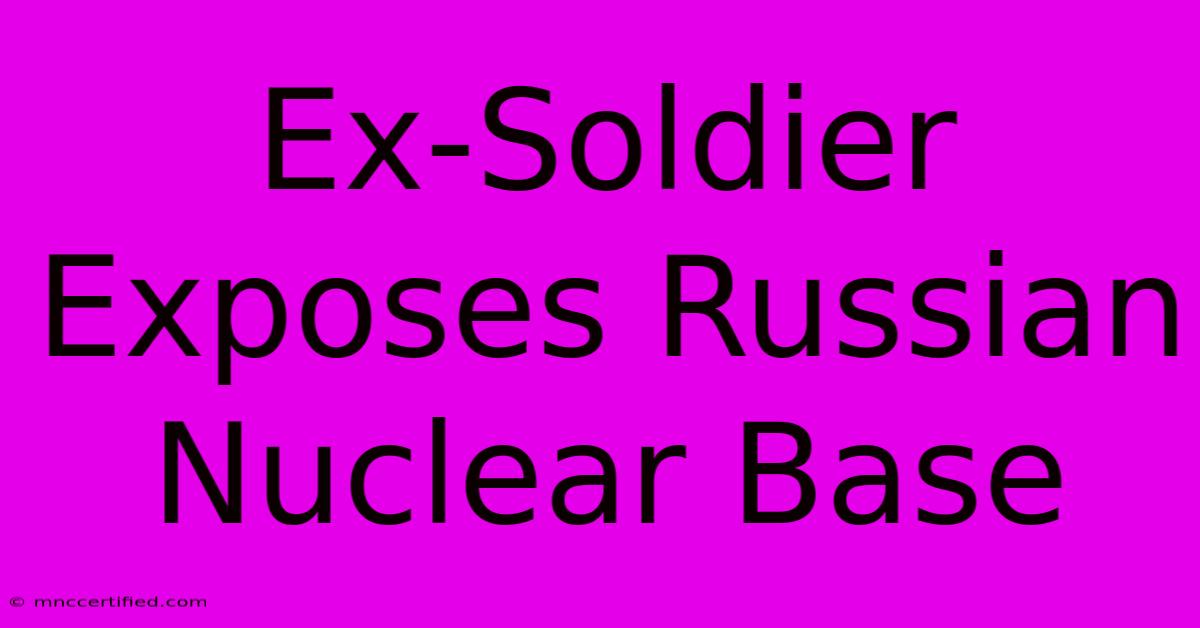Ex-Soldier Exposes Russian Nuclear Base

Table of Contents
Ex-Soldier Exposes Russian Nuclear Base: A Seismic Revelation
The world holds its breath. A former Russian soldier, identified only as "Alexei" to protect his identity, has made explosive claims about the state of Russia's nuclear arsenal and the lax security surrounding one of its most critical bases. Alexei's revelations, detailed in a series of leaked documents and interviews, paint a chilling picture of potential vulnerability and raise serious questions about global security. This unprecedented leak is not just a news story; it's a potential geopolitical earthquake.
Alexei's Allegations: A Breakdown of the Claims
Alexei, a veteran of the Russian army with several years of service at a strategically sensitive nuclear weapons base (the exact location remains undisclosed for security reasons), alleges widespread negligence, outdated security protocols, and potentially compromised nuclear materials. His claims include:
-
Inadequate Security Measures: Alexei claims the base suffered from chronic understaffing, outdated surveillance equipment, and easily bypassed security perimeters. He describes a system riddled with vulnerabilities, leaving the nuclear arsenal potentially susceptible to theft or sabotage. This nuclear security lapse is a grave concern.
-
Compromised Personnel: Alexei alleges instances of bribery and corruption within the base's ranks, raising concerns about potential insider threats. He claims certain personnel were easily susceptible to coercion, potentially jeopardizing the integrity of the entire operation. This highlights a critical flaw in Russian nuclear security protocols.
-
Outdated Equipment: According to Alexei, much of the base's security and monitoring equipment is severely outdated and unreliable, leading to significant blind spots in the security system. The reliance on obsolete technology contributes to the overall vulnerability of the Russian nuclear facilities.
-
Lack of Proper Training: Alexei highlights a significant deficiency in the training received by personnel responsible for safeguarding the nuclear arsenal. This lack of adequate training, he asserts, significantly increases the risk of accidents or deliberate breaches of security. This inadequate training is a critical concern highlighted by Alexei's testimony.
The Geopolitical Implications: A World on Edge
Alexei's revelations have sent shockwaves through the international community. The potential consequences of his claims are vast and far-reaching:
-
Increased Global Tensions: The leak has undoubtedly increased tensions between Russia and the West, prompting renewed scrutiny of Russia's nuclear capabilities and security practices. The potential for escalation is a serious concern for global security.
-
International Scrutiny of Russian Nuclear Policy: Alexei's testimony necessitates a thorough investigation into the security protocols and practices of Russian nuclear facilities. The international community will likely demand greater transparency and accountability from Russia concerning its nuclear arsenal. This calls for increased international cooperation on nuclear non-proliferation.
-
Potential for Misinformation: It's crucial to carefully assess the validity of Alexei's claims. While the information provided is compelling, there's a risk of misinformation and manipulation. Independent verification is paramount to avoid escalating tensions based on unverified intelligence.
The Future of Nuclear Security: A Call to Action
Alexei's courageous act shines a spotlight on the critical need for enhanced nuclear security worldwide. His allegations serve as a stark reminder of the potential consequences of negligence and outdated practices. The international community must collaborate to strengthen nuclear safety protocols and enhance transparency to prevent future incidents. The revelations underscore the imperative for robust nuclear security measures and the importance of ongoing dialogue to prevent catastrophic scenarios.
Further Research and Verification
While Alexei's testimony is compelling, further investigation and verification are crucial. Independent verification of his claims, including on-site inspections (if feasible), is essential to determine the accuracy and scope of the security breaches he alleges. The international community needs to engage in a concerted effort to ensure the safety and security of nuclear weapons globally. This case highlights the need for more transparent and accountable nuclear security practices worldwide. This case underscores the importance of ongoing dialogue, cooperation, and robust verification protocols for nuclear security.

Thank you for visiting our website wich cover about Ex-Soldier Exposes Russian Nuclear Base. We hope the information provided has been useful to you. Feel free to contact us if you have any questions or need further assistance. See you next time and dont miss to bookmark.
Featured Posts
-
Dynamic Corporation Trading Llc
Nov 26, 2024
-
Disability Insurance For Nurses
Nov 26, 2024
-
Dental Bonding For Enamel Loss
Nov 26, 2024
-
Hannah Kobayashi What We Know
Nov 26, 2024
-
Sam Fenders People Watching Grief
Nov 26, 2024